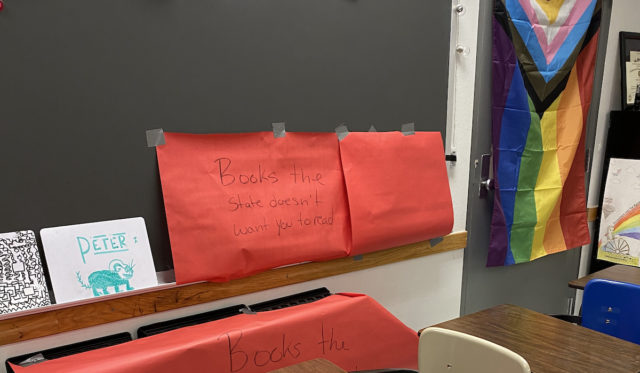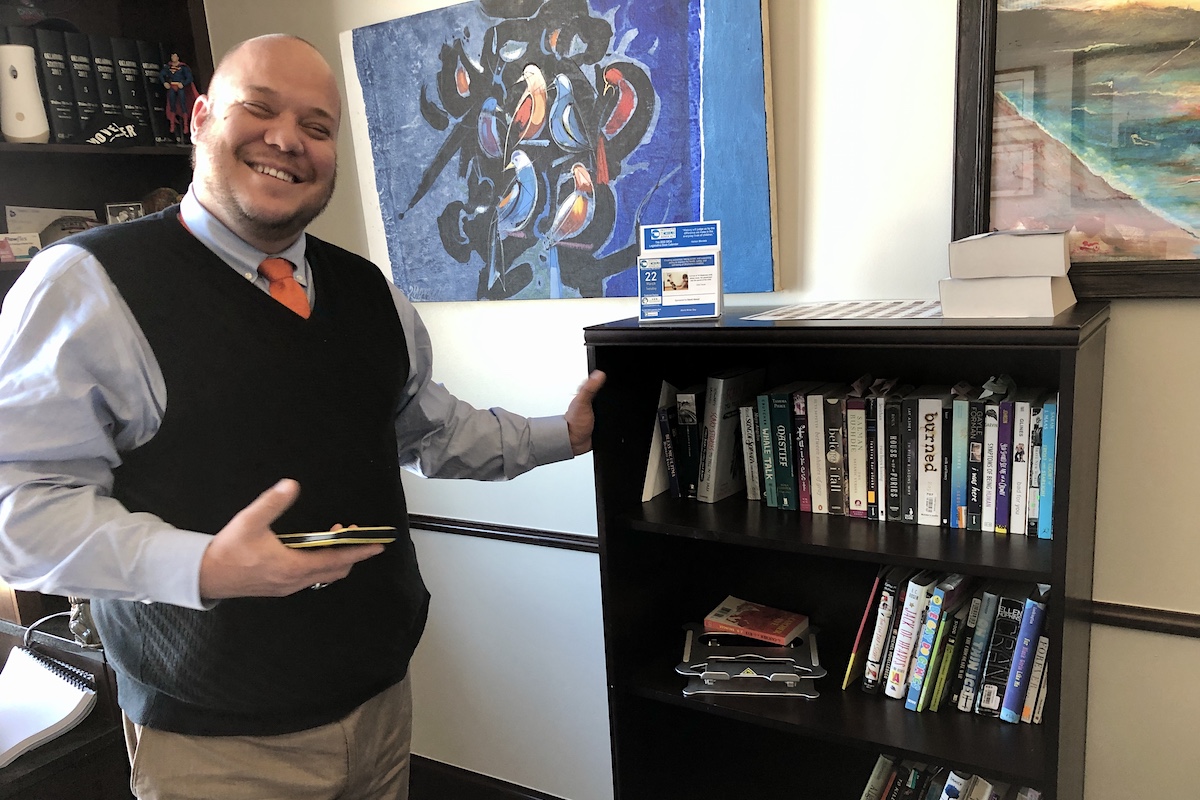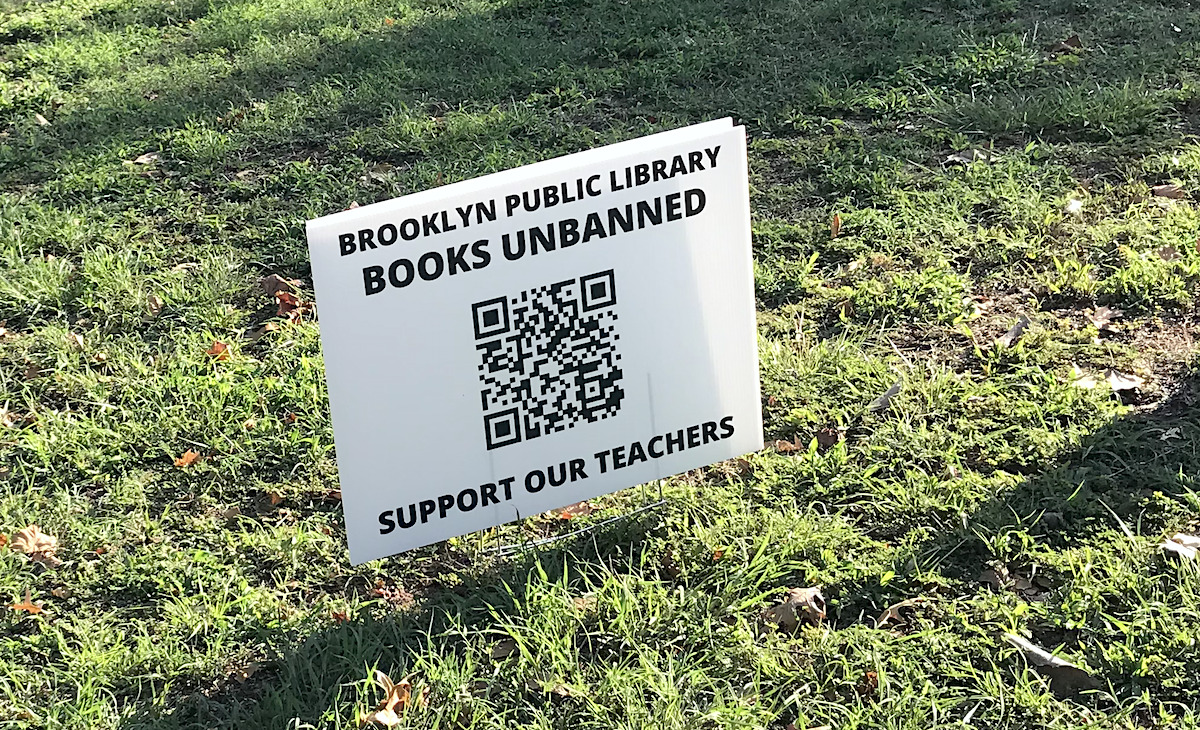

After districts in Tulsa and Mustang had their accreditation downgraded for violating HB 1775, a new law that bans the teaching of certain concepts about race and gender, Norman Public Schools teachers were told their district had a new policy for vetting classroom books in case “concerns were to arise.”
The teachers would need to read all the books in their classrooms to screen for content, provide authoritative evidence of the books’ value or “pause student access” to the books until a review could be completed.
Summer Boismier, an English teacher at Norman High School, had built her personal classroom library out to more than 500 books and did not have time to review them. So she decided to make a statement: She covered the books with red butcher paper with the words “Books the state doesn’t want you to read” emblazoned across it. She also posted a QR code to the Brooklyn Public Library’s Books Unbanned site, which provides free online access to thousands of books.
By the third day of school, a parent, identified in a KOKH Fox 25 story as Laney Dicksion, had complained about the QR code. Dicksion was mainly concerned that a book available on the Brooklyn Public Library website, Gender Queer, a graphic novel about exploring gender and sexuality, was too explicit. She has called Boismier a pedophile and has said criminal charges should be brought against her.
In the weeks since the complaint, Boismier has resigned, Secretary of Education Ryan Walters has called for her license to be revoked, and she has left her home after receiving threats and being doxxed online.
In an interview with NonDoc, Boismier said HB 1775 has had a chilling effect for teachers.
“Inside the classroom, there needs to be a community, and there needs to be a community of trust,” Boismier said. “HB 1775 has killed that. One of the reasons I chose not to go back into the classroom was, if I’m being honest with myself (…), I felt like there was now a suspicion there, at least for me, that would get in the way of having those hard conversations.”
Although the controversy over Boismier’s classroom was not directly related to issues addressed in HB 1775, the Norman teacher’s resignation is part of statewide fallout from the bill, which was signed into law in 2021 and which some educators and lawmakers say has changed the climate in Oklahoma public schools.
“The biggest issue that we’ve got going on here is the fact that districts are completely afraid of what’s coming down from the top,” said Rep. Jacob Rosecrants (D-Norman). “What happened at Mustang (Public Schools), what happened at Tulsa Public Schools has created this sense of fear, almost like a modern-day Red Scare for these districts [of] being the next to get questioning of their accreditation.”
‘Innocent until proven guilty, unless you’re a teacher’

During a recent state Board of Education meeting, Mustang High School principal Kathy Knowles stood up and spoke during the public comment period .
“We are all fearful in education right now,” she said. “My teachers have voiced numerous concerns related to the fear they have of teaching the required curriculum and possibly making a student feel uncomfortable.”
HB 1775 bans the teaching of certain concepts about race and gender, including any instruction that tells people they should “feel discomfort, guilt, anguish or any other form of psychological distress on account of his or her race or sex.” Many opponents and a lawsuit from the ACLU have criticized the law’s provisions as too vague. Some Republicans have referred to the law as a ban on critical race theory, an academic idea taught in some colleges and law schools regarding the ongoing impacts of historical racism, but the text of the bill does not mention the concept.
In July, complaints related to HB 1775 caused the Oklahoma State Board of Education to downgrade the accreditations of Tulsa Public Schools and Mustang Public Schools to “accredited with warning,” two steps below full accreditation.
In Tulsa, a teacher complained about a professional-development course that, she said, “(shamed) white people for past offenses in history.” In Mustang, a parent complained that a classroom activity in which students were asked about their experiences with discrimination made some students feel uncomfortable.
Tulsa and Mustang both requested that the board reconsider the downgrades at its Aug. 25 meeting, but the board declined the request.
Boismier said these events have been stressful for teachers in the state.
“I think everybody in education — not just teachers, but administrators, superintendents, those education advocates who support the work we do in schools out in the community — I think everyone was, for lack of a better word, frightened,” she said. “You have one individual who can bring down the accreditation of an entire district with zero due process. That’s scary.”
Norman teachers are perhaps particularly on edge, as Boismier’s resignation was not the first controversial departure this year. In June, the NPS board fired Norman High history teacher Richard Cavett after he leaked pictures of bathroom graffiti threatening a school shooting. (Cavett has said he was concerned the school would cover up the situation.)
Stephania Abell, a vocal music director at Norman High School, said the new book policy, which was announced just days before the semester started, had teachers feeling “panicky,” and Boismier’s resignation has exacerbated their unease.
“All of us were upset about that,” Abell said. “Everybody else is innocent until proven guilty, unless you’re a teacher in Oklahoma. That’s what it feels like.”
Follow @NonDocMedia on:
Crime and punishment
Sexualizing our classrooms will not be tolerated. These are not Oklahoma values and this teacher must lose her teaching certificate. @joy4ok do your job. pic.twitter.com/qvzuGtQKgQ
— Superintendent Ryan Walters (@RyanWaltersSupt) August 31, 2022
The tensions around HB 1775 have also been fueled by the 2022 election cycle.
On Aug. 26, Walters won the Republican nomination for state superintendent of public instruction, topping school leaders John Cox and April Grace and moving on to face former teacher of the year Jenna Nelson. During the race, he has said that the biggest issue facing Oklahoma education is “left-wing indoctrination” and has advocated for using HB 1775 to hold districts and teachers accountable.
In his official role as secretary of education, Walters sent an Aug. 31 letter to the State Board of Education in which he incorrectly referred to Boismier being fired and called on the board to revoke Boismier’s teaching certification. He posted the letter on Twitter along with a demand for current state superintendent and gubernatorial candidate Joy Hofmeister to “do your job.” (Hours later, he posted another version of the letter, correcting the statement about Boismier’s departure.)
“There is no place for a teacher with a liberal political agenda in the classroom,” Walters said in the letter. “Ms. Boismier’s providing access to banned and pornographic material to students is unacceptable and we must ensure she doesn’t go to another district and do the same thing.”
Fox 25 reporter Wendy Suares pointed out in a recent Twitter thread that students across the state have access to the Gender Queer book through other public library resources besides the Books Unbanned initiative.
Boismier told Fox 25 she did not ask her students to read the book, but she supports their right to read it.
While some have called for further punishment of Boismier, many Norman community members and lawmakers have spoken out in support of her and have expressed concern about the wider ramifications of Walters’ comments.
“People are frustrated,” said Norman High School parent Autumn Lockett. “Here we are in a nationwide teacher crisis, and our teachers are experiencing friendly fire.”

Rep. Logan Philips (R-Mounds), who maintains a bookshelf in his legislative office filled with titles criticized by his fellow Republicans, said he thinks recent events are bad for education in Oklahoma generally.
“I think this sets a precedent in the state of Oklahoma that Secretary Walters will actively, vindictively attack teachers if they dare speak out against the agenda that the administration is pushing,” said Phillips, who endorsed Grace and lost his own reelection bid in a heavily redistricted seat during this year’s GOP primaries. “Even teachers that are no longer in the classroom — they will punitively attack them.”
Phillips said he wants educators to know that “they have advocates at the Capitol.”
“You have friends at the Capitol,” Phillips said. “We want to see public education succeed. [Teachers] need to become very vocal.”
Boismier said she believed it wasn’t enough for teachers to be vocal, pointing to Walters’ recent primary victory against Grace.
“While I’ve never seen teachers more united around one candidate as they were with Dr. Grace in the recent runoff, as we’ve seen, it can’t just be teachers,” Boismier said. “It has to be all of us.”
‘We should not be in fear of history’

Despite the threats, Boismier said on Twitter on Sunday that she has “no plans to stop talking.”
Last week, she wrote an opinion piece for The Oklahoman in which she explained her beliefs about public education.
“Education is inherently political, but it is not automatically partisan,” Boismier wrote in her piece. “That would be, to use the word of the day, indoctrination. Politics encompasses the ideologies supporting a person’s daily choices, or lack thereof. Politics is power — who has it and who wants it. If knowledge is also power, then it would stand to reason that the classroom is indeed political.”
Boismier said that rather than making a partisan statement with her books, her display was simply an attempt to introduce herself.
“I felt like that was important to start with — ‘Here’s where I’m coming from,'” Boismier said. “And had I been allowed to continue, the following class periods is where I asked students to tell me about themselves. What do you think is important? Where do you come from? What’s your identity? What are your lived experiences that you’re comfortable sharing with me? We have to trust each other before we can have those conversations.”
She said the current political climate has made it difficult to address thorny subjects in the classroom.
“There is a definitive turn to nationalism and populism in this country,” Boismier said. “It threatens to undermine not only our ability to have those conversations but our willingness to have those conversations. I think it starts with establishing a classroom community.”
Rosecrants, a former teacher himself, also said relationships are paramount for teaching.
“When you can reach a student, you can teach a student,” Rosecrants said. “You’ve got to get to know what they care about. You’ve got to get to know what kind of traumas they had that day.”
Lockett, who is also a former teacher, said that, to her, encountering a variety of viewpoints is an important part of education.
“At the crux of it, teaching is built on relationships,” Lockett said. “At the end of the day, we’re all just trying to keep students safe and give them access to education. What I hope that my kids encounter in school is a perspective that I can’t give them at home.”
Lockett’s daughter, Ava, is a sophomore at Norman High School. She has a simple answer for what she wants from her teachers regarding sensitive topics.
“I would like them to be addressed,” Ava Lockett said. “I’m currently in world history, and I feel like my teacher’s having to walk on eggshells to teach us stuff that everyone knows happened but no one wants to bring up for fear of losing a job or getting suspended. I feel like we should not be in fear of history that already happened and that we could learn from.”
(Clarification: This article was updated at 12 p.m. Thursday, Sept. 8, to clarify the language of HB 1775. It was updated again at 1:05 p.m. to correct reference to Ava Lockett’s enrollment at Norman High School.)




















